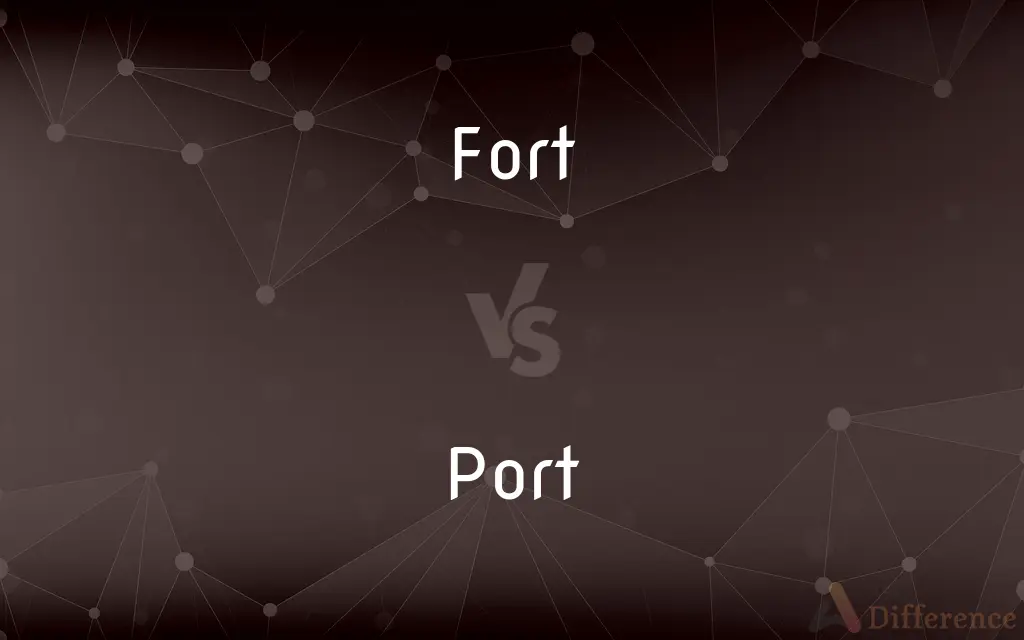Fort vs. Port — What's the Difference?
Edited by Tayyaba Rehman — By Maham Liaqat — Updated on March 7, 2024
A fort is a fortified defensive structure, while a port is a harbor where ships load and unload.

Difference Between Fort and Port
Table of Contents
ADVERTISEMENT
Key Differences
A fort is primarily a military construction designed for defense in warfare. It's built to protect against enemy attacks, often located in strategic positions to control important territories or resources. A port, on the other hand, serves as a point of embarkation and disembarkation for cargo and passengers. It's a commercial hub where goods are traded, shipped, and received. Ports are critical for international trade, providing the infrastructure for loading, unloading, storing, and distributing goods.
Forts are characterized by their robust construction, featuring walls, ditches, and often, artillery installations. They are places of strength and protection, where soldiers could defend their ground against enemies. Unlike forts, the primary concern of a port is the facilitation of maritime transport and commerce, not defense.
Forts and ports can sometimes be found close to each other, especially in coastal areas where ports are strategic for trade and susceptible to attacks. In such cases, forts were historically built to protect ports and the wealth they generated. However, the functions of forts and ports remain distinct: one is for military defense, and the other for economic activities.
While forts are largely historical, remnants of past conflicts, and now often serve as tourist attractions or historical sites, ports continue to be vital to the global economy. The importance of ports has only grown with globalization, making them central nodes in the world trade network.
The architecture and layout of forts and ports also reflect their different purposes. Forts are designed with defense in mind, featuring high walls, bastions, and protected entrances. Ports, however, are designed to maximize efficiency in handling cargo and vessels, with docks, warehouses, and cranes.
ADVERTISEMENT
Comparison Chart
Purpose
Defensive, to protect against enemy attacks.
Commercial, to facilitate maritime transport and trade.
Primary Focus
Military defense and strategic control.
Economic activities, loading, and unloading of cargo.
Construction
Features high walls, ditches, and artillery.
Equipped with docks, warehouses, and cranes.
Historical Role
Often located to defend strategic points or resources.
Critical hubs for trade and cultural exchange.
Present Role
Mostly historical sites or tourist attractions.
Vital for global economy and international trade.
Compare with Definitions
Fort
Used metaphorically to describe a place of security.
His home was his fort, where he felt safest.
Port
In computing, a connection point for transferring data.
The technician checked the port to ensure the internet connection.
Fort
A term used in games and sports to denote a defended position.
In their game of capture the flag, the children defended their fort.
Port
An international trade hub, where goods are imported and exported.
The city's economy thrived due to its status as a major port.
Fort
A military stronghold, especially in frontier areas.
The soldiers retreated to the fort to regroup.
Port
A harbor where ships dock to load and unload cargo and passengers.
The port was busy with ships arriving from around the world.
Fort
A fortified building or strategic position used for defense.
The ancient fort overlooks the city, a reminder of past battles.
Port
Used metaphorically to describe a place of safety or refuge.
After months at sea, the sailors longed for the port as their home away from home.
Fort
In historical contexts, refers to a trading post or settlement.
The fort became a bustling trading post, attracting merchants from afar.
Port
A place on a coastline that provides protection for ships and boats.
The fishermen sought refuge in the small port during the storm.
Fort
A fortified building or strategic position
The city was guarded by a ring of forts
Port
A port is a maritime facility comprising one or more wharves or loading areas, where ships load and discharge cargo and passengers. Although usually situated on a sea coast or estuary, ports can also be found far inland, such as Hamburg, Manchester and Duluth; these access the sea via rivers or canals.
Fort
A fortified place or position for the stationing of troops.
Port
A town or city with a harbour or access to navigable water where ships load or unload
The French port of Toulon
Port Elizabeth
Fort
A permanent army post.
Port
A strong, sweet dark red (occasionally brown or white) fortified wine, originally from Portugal, typically drunk as a dessert wine
Tawny ports do not need decanting
They settled down to a final glass of port
Fort
A fortified defensive structure stationed with troops.
Port
The side of a ship or aircraft that is on the left when one is facing forward
The ferry was listing to port
The port side of the aircraft
Fort
Any permanent army post.
Port
An opening in the side of a ship for boarding or loading.
Fort
(historical) An outlying trading-station, as in British North America.
Port
A socket in a computer network into which a device can be plugged
A communications port for optional cellular and other wireless modules
Fort
A structure improvised from furniture, bedding, etc., for playing games.
The kids built a fort out of chairs and pillows.
Port
A gate or gateway, especially into a walled city.
Fort
To create a fort, fortifications, a strong point, or a redoubt.
Port
The position required by an order to port a weapon
Parker had his rifle at the port
Fort
A strong or fortified place; usually, a small fortified place, occupied only by troops, surrounded with a ditch, rampart, and parapet, or with palisades, stockades, or other means of defense; a fortification.
Detached works, depending solely on their own strength, belong to the class of works termed forts.
Port
A person's carriage or bearing
She has the proud port of a princess
Fort
A fortified military post where troops are stationed
Port
A transfer of software from one system or machine to another
The first port of a commercial database to this operating system
Fort
A fortified defensive structure
Port
A suitcase or travelling bag
She packed her ports and walked out
Fort
Gather in, or as if in, a fort, as for protection or defense
Port
Turn (a ship or its helm) to port
The yacht immediately raised all sail and ported her helm
Fort
Enclose by or as if by a fortification
Port
Transfer (software) from one system or machine to another
The software can be ported to practically any platform
Fort
Station (troops) in a fort
Port
Carry or convey
We ported the milk cans from the plentiful water supply of the gym
Port
A place on a waterway with facilities for loading and unloading ships.
Port
A city or town on a waterway with such facilities.
Port
The waterfront district of a city.
Port
A place along a coast that gives ships and boats protection from storms and rough water; a harbor.
Port
A port of entry.
Port
The left-hand side of a ship or aircraft facing forward. Also called larboard.
Port
An opening in a ship's side providing access to the interior.
Port
A porthole.
Port
(Archaic) A cover for a porthole.
Port
An opening, as in a cylinder or valve face, for the passage of steam or fluid.
Port
A hole in an armored vehicle or a fortified structure for viewing or for firing weapons.
Port
An entrance to or exit from a data network.
Port
A connection point for a peripheral device.
Port
(Scots) A gateway or portal, as to a town.
Port
A rich sweet fortified wine.
Port
The position of a rifle or other weapon when ported.
Port
The manner in which one carries oneself; bearing.
Port
Of, relating to, or on the port.
Port
To turn (a craft) or make a shift to the port side
Port the helm.
Ported sharply to avoid a shoal.
Port
(Computers) To modify (software) for use on a different machine or platform.
Port
To hold or carry (a weapon) diagonally across the body, with the muzzle or blade near the left shoulder.
Port
A place on the coast at which ships can shelter, or dock to load and unload cargo or passengers.
Port
A town or city containing such a place, a port city.
Port
The left-hand side of a vessel, including aircraft, when one is facing the front. Used to unambiguously refer to directions relative to the vessel structure, rather than to a person or object on board.
Port
(rowing) A sweep rower that primarily rows with an oar on the port side.
Each eight has four ports and four starboards.
Port
An entryway or gate.
Port
An opening or doorway in the side of a ship, especially for boarding or loading; an embrasure through which a cannon may be discharged; a porthole.
Port
A space between two stones wide enough for a delivered stone or bowl to pass through.
Port
An opening where a connection (such as a pipe) is made.
Port
(computing) A logical or physical construct in and from which data are transferred. Computer port (hardware)
Port
(computing) A female connector of an electronic device, into which a cable's male connector can be inserted.
Port
Something used to carry a thing, especially a frame for wicks in candle-making.
Port
(archaic) The manner in which a person carries himself; bearing; deportment; carriage. See also portance.
Port
(military) The position of a weapon when ported; a rifle position executed by throwing the weapon diagonally across the front of the body, with the right hand grasping the small of the stock and the barrel sloping upward and crossing the point of the left shoulder.
Port
(computing) A program that has been adapted, modified, or recoded so that it works on a different platform from the one for which it was created; the act of this adapting.
Gamers can't wait until a port of the title is released on the new system.
The latest port of the database software is the worst since we made the changeover.
Port
A set of files used to build and install a binary executable file from the source code of an application.
Port
A type of very sweet fortified wine, mostly dark red, traditionally made in Portugal.
Port
(Australia) A suitcase or schoolbag.
Port
(nautical) Of or relating to port, the left-hand side of a vessel when facing the bow.
On the port side
Port
To turn or put to the left or larboard side of a ship; said of the helm.
Port your helm!
Port
To carry, bear, or transport. See porter.
Port
(military) To hold or carry (a weapon) with both hands so that it lays diagonally across the front of the body, with the barrel or similar part near the left shoulder and the right hand grasping the small of the stock; or, to throw (the weapon) into this position on command.
Port arms!
Port
To adapt, modify, or create a new version of, a program so that it works on a different platform. Porting (computing)
Port
To carry or transfer (an existing telephone number) from one telephone service provider to another.
Port
To transfer a voucher or subsidy from one jurisdiction to another.
Port
A dark red or purple astringent wine made in Portugal. It contains a large percentage of alcohol.
Port
A place where ships may ride secure from storms; a sheltered inlet, bay, or cove; a harbor; a haven. Used also figuratively.
Peering in maps for ports and piers and roads.
We are in port if we have Thee.
Port
In law and commercial usage, a harbor where vessels are admitted to discharge and receive cargoes, from whence they depart and where they finish their voyages.
Port
A passageway; an opening or entrance to an inclosed place; a gate; a door; a portal.
Him I accuseThe city ports by this hath entered.
Form their ivory port the cherubimForth issuing.
Port
An opening in the side of a vessel; an embrasure through which cannon may be discharged; a porthole; also, the shutters which close such an opening.
Her ports being within sixteen inches of the water.
Port
A passageway in a machine, through which a fluid, as steam, water, etc., may pass, as from a valve to the interior of the cylinder of a steam engine; an opening in a valve seat, or valve face.
Port
The manner in which a person bears himself; deportment; carriage; bearing; demeanor; hence, manner or style of living; as, a proud port.
And of his port as meek as is a maid.
The necessities of pomp, grandeur, and a suitable port in the world.
Port
The larboard or left side of a ship (looking from the stern toward the bow); as, a vessel heels to port. See Note under Larboard. Also used adjectively.
Port
To carry; to bear; to transport.
They are easily ported by boat into other shires.
Port
To throw, as a musket, diagonally across the body, with the lock in front, the right hand grasping the small of the stock, and the barrel sloping upward and crossing the point of the left shoulder; as, to port arms.
Began to hem him round with ported spears.
Port
To turn or put to the left or larboard side of a ship; - said of the helm, and used chiefly in the imperative, as a command; as, port your helm.
Port
A place (seaport or airport) where people and merchandise can enter or leave a country
Port
Sweet dark-red dessert wine originally from Portugal
Port
An opening (in a wall or ship or armored vehicle) for firing through
Port
The left side of a ship or aircraft to someone facing the bow or nose
Port
(computer science) computer circuit consisting of the hardware and associated circuitry that links one device with another (especially a computer and a hard disk drive or other peripherals)
Port
Transfer data from one computer to another via a cable that links connecting ports
Port
Put or turn on the left side, of a ship;
Port the helm
Port
Bring to port;
The captain ported the ship at night
Port
Land at or reach a port;
The ship finally ported
Port
Turn or go to the port or left side, of a ship;
The big ship was slowly porting
Port
Carry, bear, convey, or bring;
The small canoe could be ported easily
Port
Carry or hold with both hands diagonally across the body, especially of weapons;
Port a rifle
Port
Drink port;
We were porting all in the club after dinner
Port
Located on the left side of a ship or aircraft
Common Curiosities
Can a fort and a port be located in the same place?
Historically, yes. Forts were often built near ports to protect them from enemy attacks.
Can a port be used for leisure activities?
Yes, many ports have areas dedicated to recreational activities, including marinas for personal boats.
What determines the location of a fort?
Strategic military considerations, including the defense of territories, resources, or important routes.
Are there different types of ports?
Yes, including cargo ports, container ports, and cruise ports, each serving different functions.
What is a digital port in computing?
A virtual connection point for transferring data between computers or devices.
Can the design of a fort still influence modern military architecture?
Yes, the principles of fortification can influence the design of modern military bases and defense structures.
How do ports handle security concerns?
Ports implement security measures including surveillance, patrols, and regulations to safeguard against threats.
Are forts still built today?
Modern military defense strategies have evolved, so traditional forts are rare, but similar defense structures exist.
How do ports contribute to the economy?
Ports are crucial for international trade, facilitating the import and export of goods and contributing to economic growth.
How has the role of ports changed over time?
While the fundamental role of ports in trade has remained, their capacity and technology have evolved significantly.
What is the significance of forts in history?
Forts have played key roles in military campaigns, protecting territories and influencing the outcomes of wars.
How do environmental concerns affect ports?
Ports are adapting to reduce environmental impact, including pollution control and implementing green technologies.
How are forts preserved for historical significance?
Many forts are maintained as historical sites or museums to educate the public about their history and significance.
Can a port ever close down?
Yes, due to economic, environmental, or strategic reasons, ports can close or relocate.
Do ports need to be near the sea?
No, there are inland ports located on rivers or lakes, connected to the sea via waterways.
Share Your Discovery

Previous Comparison
Weal vs. Woe
Next Comparison
Lactulose vs. LactitolAuthor Spotlight
Written by
Maham LiaqatEdited by
Tayyaba RehmanTayyaba Rehman is a distinguished writer, currently serving as a primary contributor to askdifference.com. As a researcher in semantics and etymology, Tayyaba's passion for the complexity of languages and their distinctions has found a perfect home on the platform. Tayyaba delves into the intricacies of language, distinguishing between commonly confused words and phrases, thereby providing clarity for readers worldwide.
















































